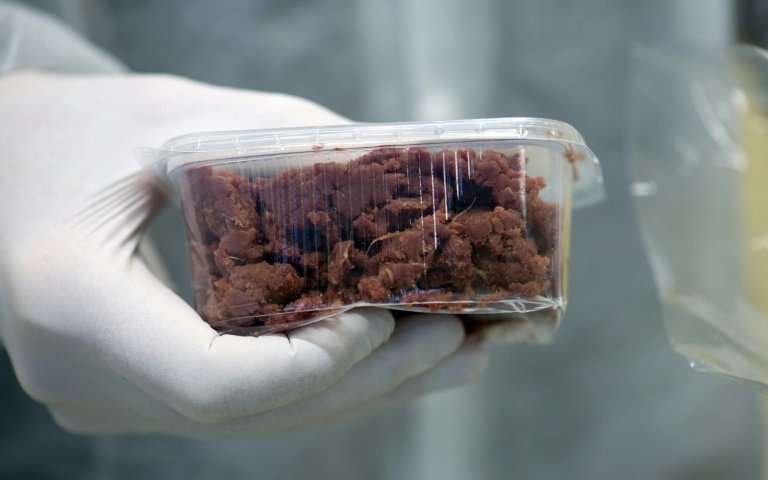"Lab meat"'s backers argue avoiding slaughtering animals will reduce both suffering and greenhouse emissions US authorities on Friday agreed on how to regulate food products cultured from animal cells—paving the way to get so-called "lab meat" on American plates.
The Department of Agriculture and the Food and Drug Administration agreed to share regulation of cell-cultured food products, they said in a joint statement, following a public meeting in October.
While technical details have yet to be confirmed, the FDA would oversee the collection and differentiation of cells—when stem cells develop to specialized cells— while USDA would oversee production and labeling of food products.
"This regulatory framework will leverage both the FDA's experience regulating cell-culture technology and living biosystems and the USDA's expertise in regulating livestock and poultry products for human consumption," the statement said, adding that the agencies see no need for legislation on the matter.
The question of whether to approve cell-cultured food products has never really arisen in the US. In fact, several niche "lab-meat" startups already exist, but production costs are very high and nobody has a product that is ready to sell yet.
Californian company Just, known for its eggless mayonnaise, has said previously it plans to sell cell-cultured meat by the end of this year—and told AFP it looked forward to working with the agencies.
Others such as Memphis Meats and Mosa Meat, in the Netherlands, are working to get production costs down—with some backing from the agri-food industry.
The backers of "lab meat" argue avoiding slaughtering animals will reduce both suffering and greenhouse emissions—and is a sustainable option to feed growing populations hungry for protein.
"American consumers deserve a wide array of healthy, humane, and sustainable choices," said Jessica Almy, policy director at The Good Food Institute.
But they are locked in disagreement with farming organizations about whether such products can indeed be called "meat."
The authorities have made no statement on that—but the US Cattlemen's Association welcomed the news.
"USDA is going to oversee labeling, which we are ecstatic about because the FDA does not require pre-market label approval... before the products hits the shelves," said spokeswoman Lia Biondo.
Explore further: Meat 2.0? Clean meat? Spat shows the power of food wording

Juanlareyna on November 18th, 2018 at 01:04 UTC »
I swear this sub is like r/50/50 sometimes it's stuff like this where I'm excited and hopeful about the future and the advancements of humans and the other half it's something about how climate change will kill us all in twenty years.
I could wake up in thirty years and the world could be mad max or star trek and either way I wouldn't be surprised.
But I'm excited to try lab meat, seems great all around.
curebaldness on November 17th, 2018 at 23:39 UTC »
Lab grown meat to ingest is ok. But lab grown follicles to implant in skin and cure baldness? NOPE.
Ridiculous.
tetrahydroca on November 17th, 2018 at 22:34 UTC »
I suppose cattle growers will pressure the USDA to forbid calling this meat. If it's animal (cell) tissue sold as food, then I think it should be called what it is: meat.
Either way, these products will be a huge leap forward for animal welfare. Not to mention a great investment in multiple product IPOs on the horizon.